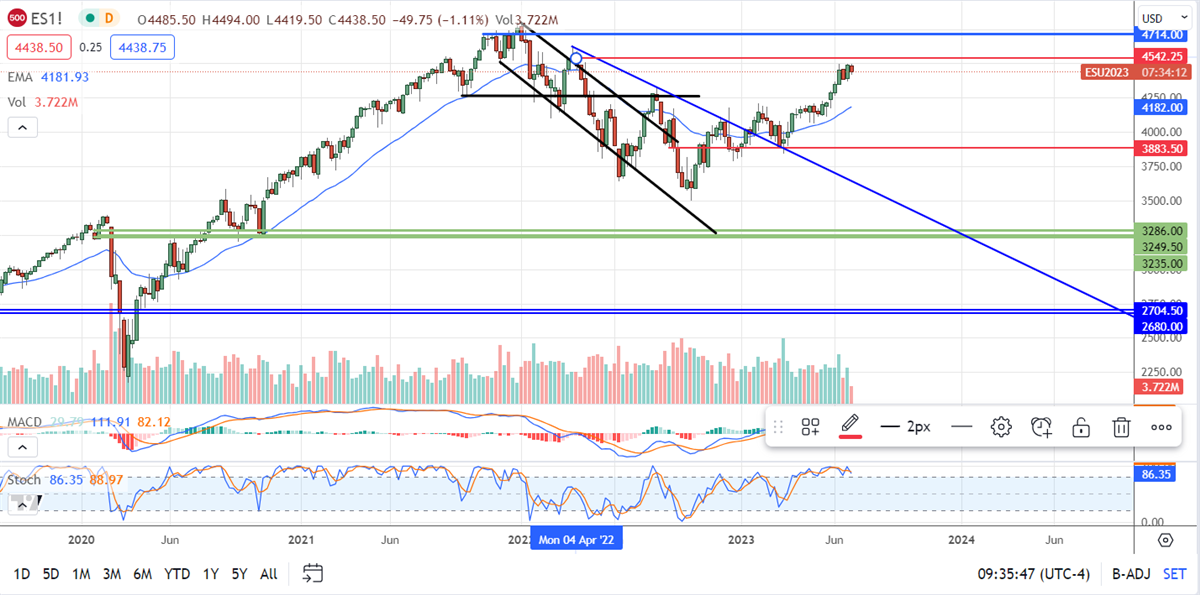
The June employment situation summary revealed weaker-than-expected job growth and a potential crack in the labor market. The news suggests weakening demand for employment and is backed up by other data, but the takeaway isn’t all that bearish. While the NFP was tepid, it is still trending above the pre-pandemic levels with low unemployment, ample job availability, and rising wages. In this scenario, the FOMC remains on track to hike interest rates by another 25 basis points, which could cause the labor market to crack and lead the US into a downward spiraling recession.
NFP Tepid: Trends Are Strong, Employment Robust
The headline NFP figure came in at 209,00 compared to the expectation for nearly 300,000 new jobs, and the ADP figure showed nearly 500,000 new jobs. The ADP and the NFP don’t often track in sync but track together over time. The latest data aligns with those trends and suggests hiring conditions remain robust. One sign of weakness in the hiring data is the decline in white-collar jobs and the uptick in blue-collar jobs, which suggests average job quality is declining. Hiring is also robust even with the revisions, which shaved 110,000 off the previous data.
Unemployment remains solid at 3.6%, where it has been trending for the last few months. This is the more significant figure to pay attention to; when it begins to track higher, it will signal a shift in hiring trends that will weigh on the economic outlook. The troubling data within the report is the wage gains.
Wages increased by $0.12 from last month’s adjusted figure or $0.14 on an as-reported basis resulting in hotter-than-expected inflation. Wages rose more than 0.4% MoM and 4.6% YOY to accelerate from the previous month’s hot figures. This and labor market strength helped seal the deal concerning the Fed.
The CME FedWatch Tool shows the news increased the odds of an FOMC rate hike by several hundred basis points. The odds of a single 25 bps hike rose to over 95% for the July meeting, and the odds of 2 more hikes, which the market has until now discounted, rose to 40% by the end of the year.
That puts the base rate above 550 basis points which should keep the average 30-year mortgage above 7.5%. That’s a significant figure because it has been the cut-off point for new home buyers this year- when rates fall back to ward 7% or lower, home sales surge when they rise to nearly 7.5%, home sales slow.
A Hidden Risk Within The Labor Market
Not all of the labor data is rosy. The Challenger, Gray & Christmas report on planned layoffs and hirings suggest that labor trends weaken and will weaken further as interest rates climb. The number of planned layoffs fell nearly 50% in June compared to May, which is good news, but the figure is still up 25% YOY, 244% YTD, and at the highest levels in over a decade, not counting the pandemic.
Another rate increase may spark more bank closures, it will cause capital markets to tighten, and more layoffs will follow. Regarding hiring, hiring plans are at the lowest levels in years and do not suggest that strength will continue until the year's end.
The S&P 500 (NYSEARCA: SPY) held steady on the news, but the market may be at the top. The summer melt-up hit resistance earlier in the week and may have difficulty clawing its way higher now. The critical support and resistance points are near the short-term EMA at 4368 and the current high near 4,500. A move up to a new high could result in a new all-time high, and a move lower to a new low could result in a significant correction.


